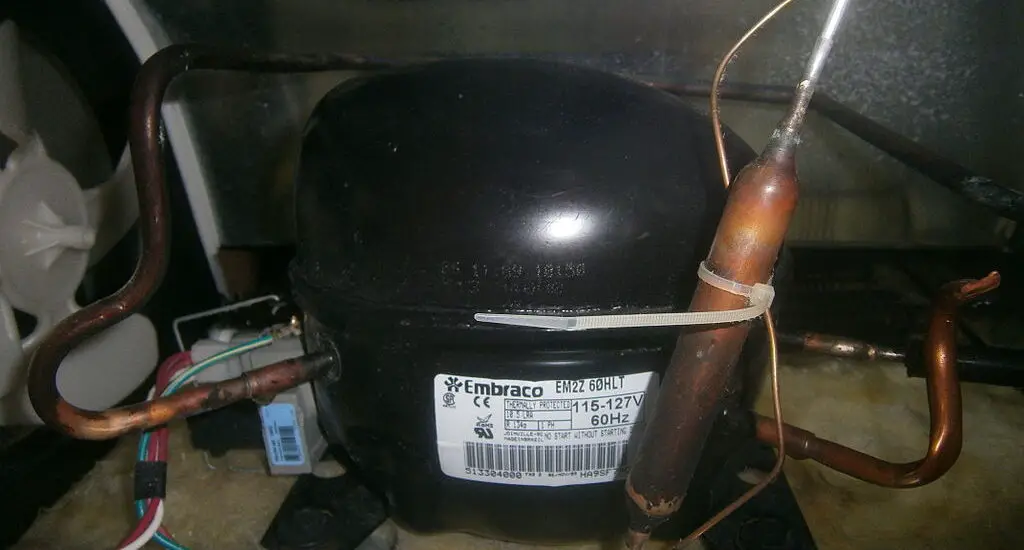In this article, we’ll be talking about the refrigerator compressor gas name. It’s a topic that might not cross your mind until that fridge of yours starts acting up, but understanding it can really save the day when you’re in a pinch!

Table of Contents
Quick Overview of Refrigerator Compressor Gas
You know your fridge keeps your food cold, right? But, do you know how it does that? It’s all thanks to the compressor gas. It’s the crucial player that absorbs heat from inside your fridge and dissipates it outside, making sure your leftovers stay cool and fresh. Let’s explore further…
Understanding the Refrigerator Compressor
Let’s break this down a bit. The refrigerator compressor is essentially the heart of your fridge. It’s responsible for pumping the gas (or refrigerant) that cools everything down.
Definition and Function of a Refrigerator Compressor
A refrigerator compressor is a mechanical device that increases the pressure of the gas to push it through the fridge’s cooling system. Without it, your fridge is just an insulated box. Cool, right?
Role of Gas in a Refrigerator Compressor
And the gas? Well, the gas in the compressor is the lifeblood of this cooling cycle. As it moves through the system, it goes from high to low temperatures and back again, taking the heat from your food and drinks along for the ride.
Types of Gas Used in Refrigerator Compressors
Alright, so we know the gas is important. But what kind of gas is it? Well, that depends on when your fridge was made and where in the world it was manufactured. Let’s take a look.
Chlorofluorocarbons (CFCs)
Way back, CFCs were the go-to gas for refrigerator compressors. However, we’ve since learned that these gases are not great for the environment.
Usage of CFCs in Early Refrigerator Compressors
Back in the day, the refrigerator compressor gas name that kept popping up was ‘CFC’. These gases were pretty effective at cooling things down, but boy did they have some negative side effects.
Environmental Impact of CFCs
See, CFCs are infamous for their role in depleting the ozone layer. That’s why manufacturers had to shift to more eco-friendly options. Nobody wants a chilled soda at the expense of the planet, right?
Hydrochlorofluorocarbons (HCFCs)
The next kid on the block was HCFCs. While they were definitely a step up from CFCs, they weren’t perfect.
Transition from CFCs to HCFCs
With the knowledge of CFC’s damaging effects, manufacturers made the shift to HCFCs. They were less harmful to the ozone layer, but they were still not the best choice for our environment.
Environmental Considerations for HCFCs
While they did less damage to the ozone layer, HCFCs were found to be potent greenhouse gases, contributing to global warming. So, the search for a better gas continued.
Hydrofluorocarbons (HFCs)
Enter HFCs. These are the gases you’ll likely find in most modern fridges. They do the job and they’re much kinder to our ozone layer, but there’s still room for improvement.
Present-day Use of HFCs in Refrigerator Compressors
Most refrigerators today use HFCs as their compressor gas. They do not deplete the ozone layer like their predecessors. Sounds good, right? But there’s a catch.
Environmental Impact of HFCs
While HFCs are ozone-friendly, they’re still potent greenhouse gases. However, they’re still the best we’ve got for now until manufacturers find a more eco-friendly alternative.
Check out these other related articles…
Refrigerator Compressor Temperature: Your Essential Guide
Refrigerator Compressor Terminals: Your Comprehensive Guide
How to Check Refrigerator Compressor Relay: A Detailed Guide
Refrigerator Compressor Jump Start: The Definitive Guide
How to Recharge Refrigerator Compressor: A Handy DIY Guide
How to Determine the Type of Gas in Your Refrigerator Compressor
Now, you might be wondering what type of gas is in your fridge at home. Well, there are a couple of ways to figure this out.
Identifying the Gas Type through Model and Manufacture Date
One way is to look up your fridge’s model number and manufacture date. This info can give you a good hint about the type of gas used. Older fridges are likely to use CFCs or HCFCs, while newer models will likely use HFCs.
Guidelines for Identifying Gas Type
Still not sure? Well, you can also look at the manufacturer’s specifications or check the label on the back of your fridge. They often list the type of refrigerant used. Keep in mind though, messing with these gases isn’t a DIY project.
Seeking Professional Assistance
If you’re still unsure or if you suspect a gas leak, it’s always best to call in a professional. They’ve got the tools and know-how to handle these gases safely and effectively.
Benefits of Professional Diagnosis
By calling a professional, you can ensure the job is done right. They can accurately identify the gas and handle any issues that might have cropped up. Peace of mind, anyone?
Safety Considerations When Handling Refrigerator Compressor Gas
Safety first, folks! It’s really important to remember that you should never try to handle these gases yourself. They can be dangerous if mishandled, and it’s always best to let a professional do the work.
Precautions for Handling Compressor Gas
As we’ve said before, let a pro handle this. These gases can cause harm if leaked and should only be dealt with using proper safety gear.
Safety Equipment for Handling Compressor Gas
Professionals use a range of safety equipment when dealing with these gases, from protective clothing to specific tools. They’re trained to do this, so sit back and let them handle it.
Environmental Impact of Improperly Handling Refrigerator Compressor Gas
Let’s not forget that improper handling can also harm the environment. Gas leaks can contribute to global warming and deplete the ozone layer. Not a pretty picture, right?
Consequences and Preventions of Gas Leaks
Gas leaks can lead to increased greenhouse gas emissions, and that’s not good for our planet. The best prevention? Regular maintenance by a professional and immediate action when a leak is suspected.